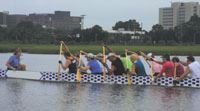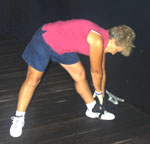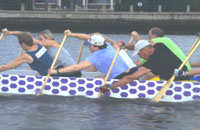Cancer survivors find fitness in paddling
by Heather MurphyPublic Relations
An ancient Chinese proverb says, “A smile will gain you 10 more years of life.”
While few would underestimate the power of positive thinking, it’s safe to say that in addition to that smile, physical fitness and overall wellness help to lengthen life as well.
 The
Dragon Boat Charleston team digs in during an early morning workout as
they practice an official race start. Cindy Carter, far left, encourages
fellow paddlers to keep it moving as they pass MUSC and Hollings Cancer
Center buildings in the background. The team is comprised of 90 percent
cancer survivors and plans to begin a series of competitions in October.
The
Dragon Boat Charleston team digs in during an early morning workout as
they practice an official race start. Cindy Carter, far left, encourages
fellow paddlers to keep it moving as they pass MUSC and Hollings Cancer
Center buildings in the background. The team is comprised of 90 percent
cancer survivors and plans to begin a series of competitions in October.
And as cancer survivors, the members of Dragon Boat Charleston remain as committed to living a healthy life as when they battled cancer for control of the future.
Dragon Boat Charleston’s roots lie in an ancient Chinese sport more than 2,000 years old. Emerging research suggests physical activity not only has a positive effect on quality of life following a cancer diagnosis, but also that it may improve survival.
On this Thursday morning, 20 or so people mill about a City Marina dock before sunrise waiting for others to arrive.
They chatter like school children waiting for the first bell to ring, happy to see each other.
Sterling Hannah, volunteer coordinator for Hollings Cancer Center, greets everyone. Noting a number of new faces, she asks everyone to introduce themselves. There’s a deviation from the normal routine, as Noreen Powers, the paddling coach, can’t make practice this morning, so Cindy Carter, a fellow paddler, is asked to coach in her place.
 Sylvia
Huskey, breast cancer survivor and team member, stretches before practice.
Sylvia
Huskey, breast cancer survivor and team member, stretches before practice.
Sylvia Huskey, a breast cancer survivor since 1999, saw the ad for the Dragon Boat in the paper. “I’m an adventurous and athletic person so I figured I’d try something new. You usually don’t or can’t talk to other people about dealing with cancer, so the team is wonderful for that kind of support and camaraderie.”
Betty Johnson, free of ovarian cancer since May, just had her second CT Scan, and everything looks good. “I love being a part of this team,” she said. ”It’s fun, it’s competitive and it’s nice to be around people who are going or have gone through the same things you have.”
Moments later, in response to a request for the time, Carter said, “It’s paddling time!”
Two by two, the paddlers hopped into the 48 foot long boat, with its painted scales and room enough for the cox (coach’s seat) and steer (back of the boat). The boat also has a dragon’s head and tail, although not used during practices.
Ninety percent of the team are cancer survivors, and Hannah hopes to have survivors in the cox and steer positions as well.
“We have a tremendous number of survivors and supporters who like to participate,” Hannah said. “I want to have a fleet of dragon boats for competition and to make the program even larger and more successful.”
The team begins to paddle, working on form and timing.
 “Coach
of the day” Cindy Carter readies the team to practice a new technique as
the windows of Battery homes watch them go by.
“Coach
of the day” Cindy Carter readies the team to practice a new technique as
the windows of Battery homes watch them go by.
Running through proper “start” technique, the team must have it down for the first competition in October in Philadelphia, Pa. Then it will be Fort Lauderdale, Fla. in February and Vancouver, Canada in June.
The team’s goal is to paddle 60 strokes per minute for a three minute, 500-meter dash.
 Team
members must work very hard to achieve accurate form and precise timing.
Paddling offers camaraderie and a sense of accomplishment in addition to
the great physical workout.
Team
members must work very hard to achieve accurate form and precise timing.
Paddling offers camaraderie and a sense of accomplishment in addition to
the great physical workout.
“Timing is everything, but endurance is just as important,” Hannah said. “The great thing about this fitness/wellness program is that it incorporates so much emotional and mental well being.”
Hannah also believes in the healing power of water; she noted the serenity and calmness that accompanies an early morning paddle.
Louise Graff, assistant coach and self-described “aquaholic,” echoes Hannah’s sentiments. “I’ve always been interested in water, and I love working with this team. It’s not just the charitable aspect, either,” she said. “This is truly a fantastic group of people.”
After practice came to a close, the paddlers exited the boat with smiles, pats on the back and a chorus of “Nice work” and “Great job.”
“At Hollings, we felt like the Dragon Boat program was a natural fit
with Charleston’s warm climate and scenic waterways,” said Hannah. “We’ve
received an overwhelmingly enthusiastic response and we are as committed
to helping the program grow and flourish, as we are to helping our survivors
and our supporters do the same.”
Catalyst Online is published weekly, updated as
needed and improved from time to time by the MUSC Office of Public Relations
for the faculty, employees and students of the Medical University of South
Carolina. Catalyst Online editor, Kim Draughn, can be reached at 792-4107
or by email, catalyst@musc.edu. Editorial copy can be submitted to Catalyst
Online and to The Catalyst in print by fax, 792-6723, or by email to petersnd@musc.edu
or catalyst@musc.edu. To place an ad in The Catalyst hardcopy, call Community
Press at 849-1778.